CIRJE Conferences 2018
- Industrial Organization Conference at the University of Tokyo, March 21, 2019
- The 14th Joint conference of Seoul National University and The University of Tokyo, Current Topics of Macroeconomics, December 7, 2018
- 27th NBER-TCER-CEPR Conference, July 27, 2018
- Special TWID on Evidence-based Policy Making, June 21, 2018
- Workshop on Advances in Econometrics 2018, June 17 to 18, 2018
- Global History and Hybrid Political Economy in Early Modern Eurasia, c.1550-1850, April 21 to 22, 2018
Industrial Organization Conference at the University of Tokyo
- Organizers: Hiroshi Ohashi (The University of Tokyo)
Naoki Wakamori (The University of Tokyo) - March 21, 2019
- Venue: Kojima Conference Room, Economics Research Annex (Kojima Hall), The University of Tokyo
- Program
-
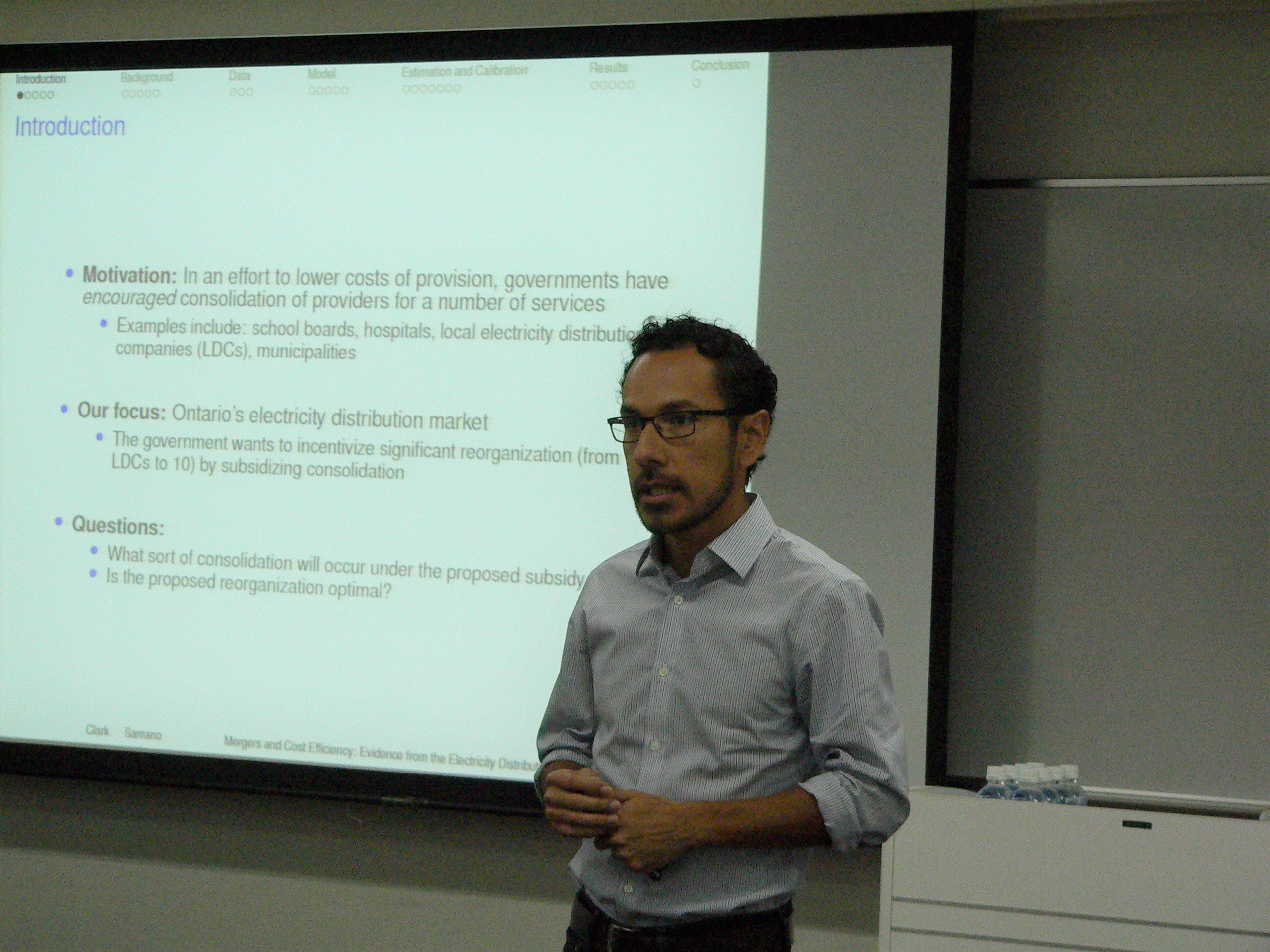
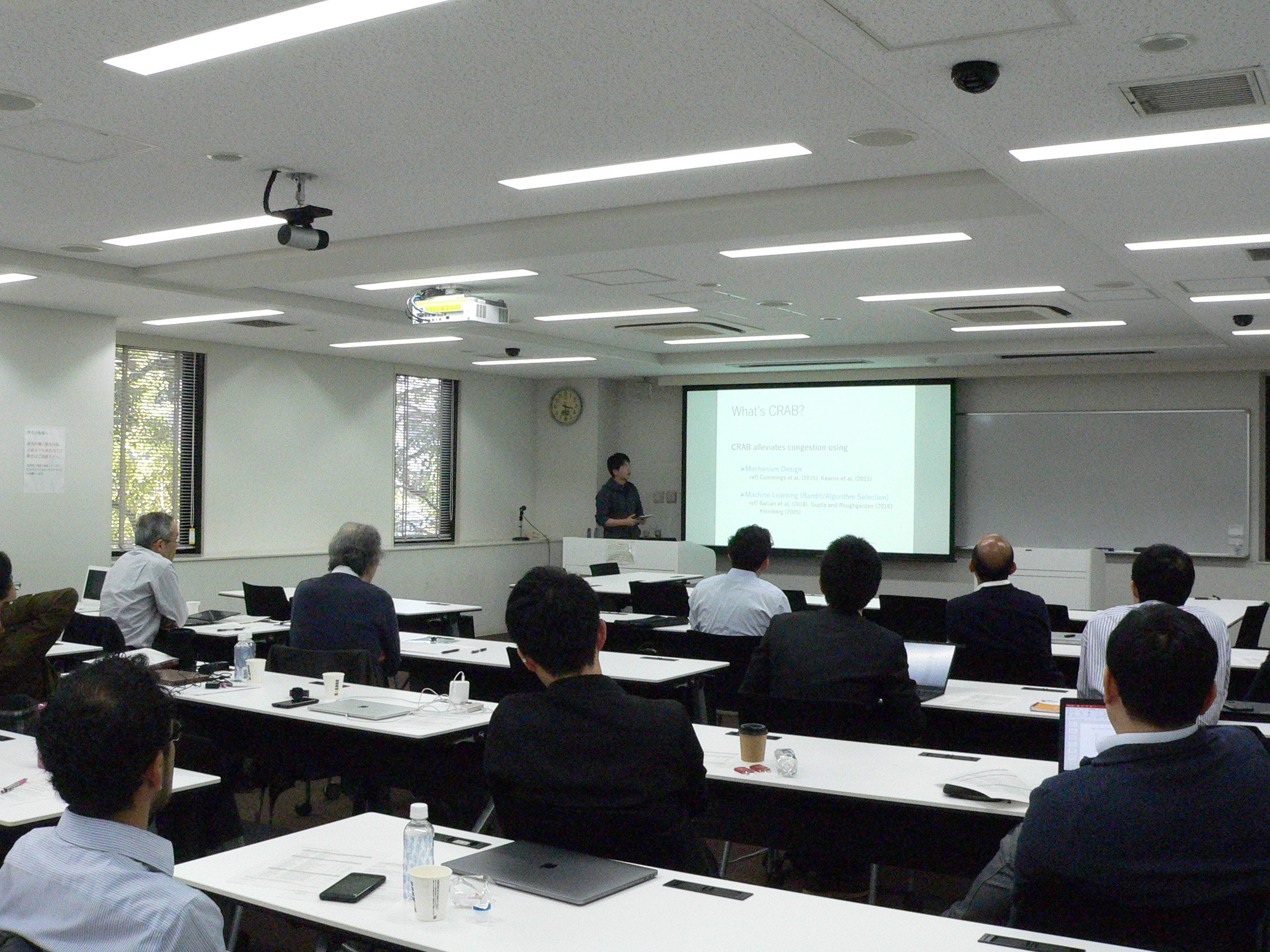
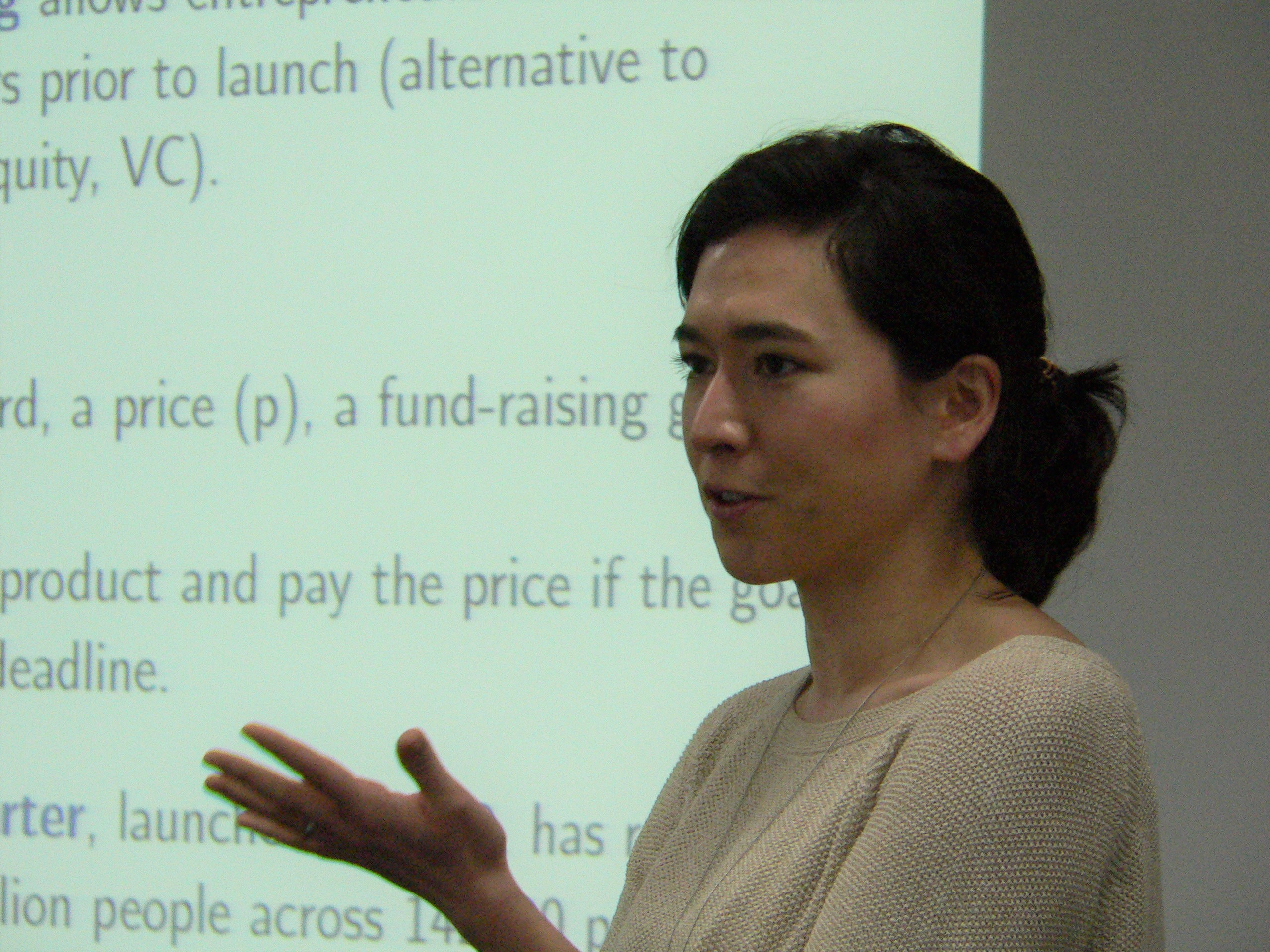
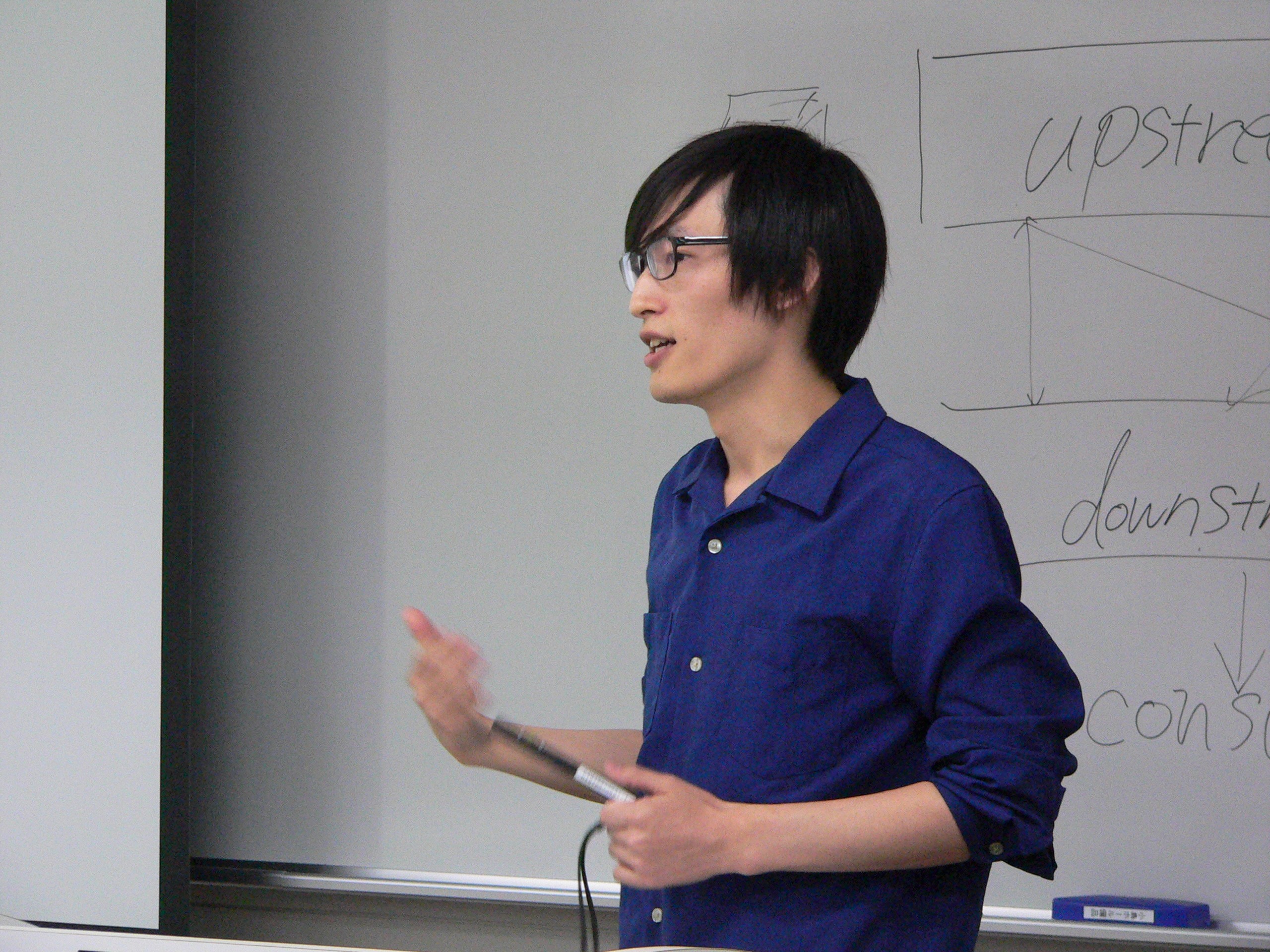
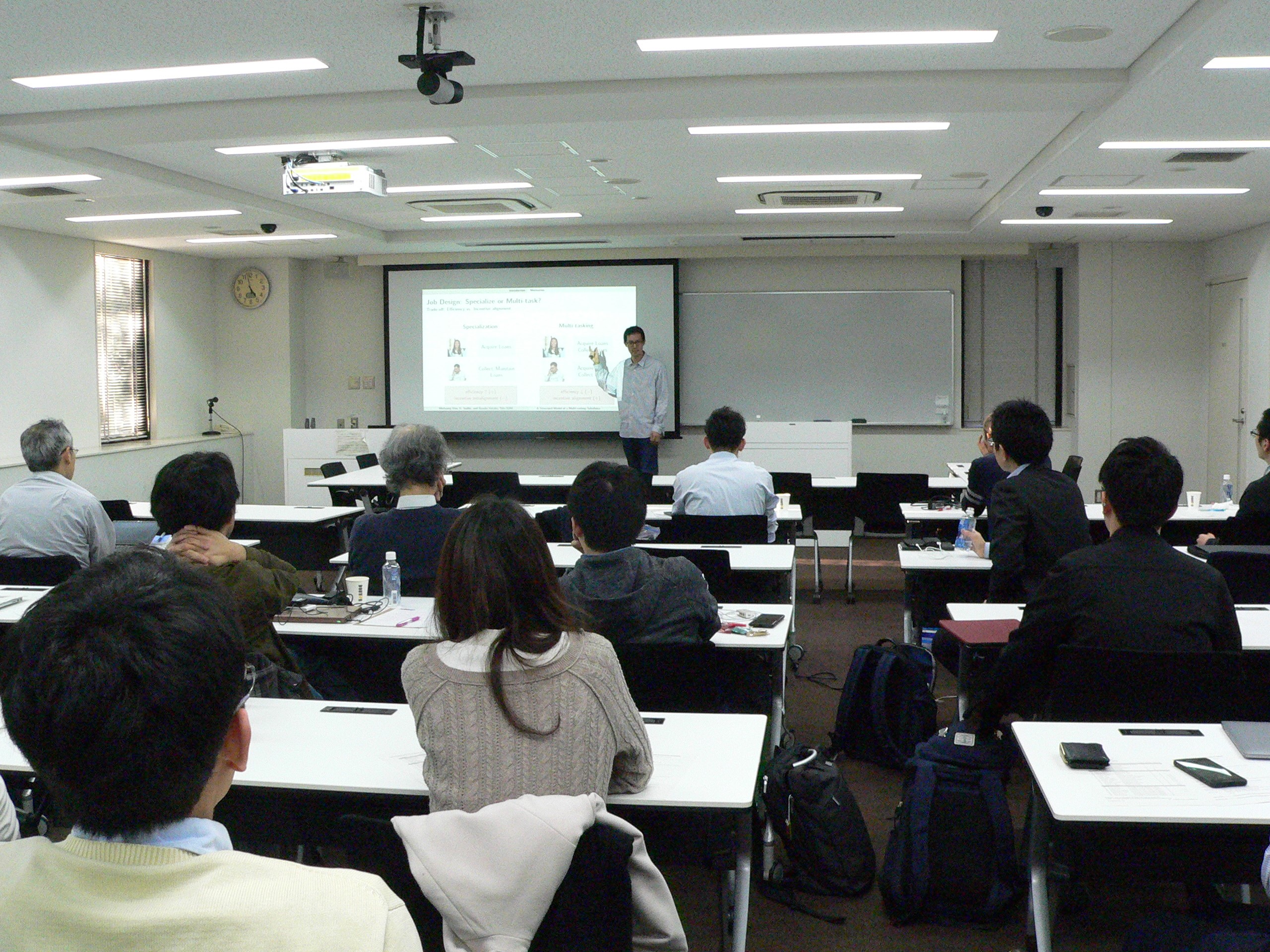
We invited 6 outstanding domestic and international researchers to present their frontier research. In the morning session, Ken Onishi from Federal Reserve Board and Mario Samano from HEC Montreal presented their papers on the Japanese and Canadian electricity markets, respectively, whereas Aniko Oery from Yale University presented her theoretical paper on the crowdfunding industry. In the afternoon session, we again had three presenters: (i) Kohei Hayashida from University of Tokyo, who presented his paper on the milk industry, featuring the bargaining process between milk producers and retailers, (ii) Takeshi Murooka from Osaka University, who provides an explanation why we observe zero-pricing for experienced goods, and (iii) Kosuke Uetake from Yale University, presented a paper on the Mexican bank loan officers’ incentive issue. We also had a unique session, called Lightning Talk Session, where each non-presenter presented his/her research topics as well as self-introduction within 3 to 7 minutes, in order to facilitate network activities. This session indeed worked very well and all participants could successfully know each other at the end of the conference, which hopefully enables us to have further international/domestic collaborations.
The 14th Joint conference of Seoul National University and The University of Tokyo
Current Topics of Macroeconomics
- Organizers:
Center for Distributive Justice, The Institute of Economic Research, Seoul National University
The Center for International Research on the Japanese Economy (CIRJE), The University of Tokyo - December 7, 2018
- Venue: Kojima Conference Room, Economics Research Annex (Kojima Hall), The University of Tokyo
- Program
-
The Joint Conference with Seoul National University (SNU) was held at Kojima Conference Room, Kojima Hall, University of Tokyo on December 7 (Friday), 2018. This was the fourteenth annual conference between CIRJE and Institute of Economic Research in SNU. The theme of the conference was "Current Topics of Macroeconomics ". At the conference, we had wonderful speakers and fruitful discussions on important policy issues in macroeconomics. From University of Tokyo, Makoto Nirei and Kenichi Ueda presented a paper, Kosuke Aoki and Tsutomu Watanabe served as a discussant, and Shin-ichi Fukuda, Ryuzo Miyao, and Sagiri Kitao chaired a session. From SNU, Jay H. Hong and Woong Yong Park presented a paper, while Young Sik Kim and Soyoung Kim served as a discussant. Under growing uncertainty in the world economy, the establishment of a new policy framework is now one of the urgent tasks. We had hot discussions on what structural reforms are desirable and how to design economic system in the world economy from various macroeconomic perspectives. At the end of the conference, we confirmed further collaborations between CIRJE and Institute of Economic Research in SNU.
27th NBER-TCER-CEPR Conference
- Organizers:
Shin-ichi Fukuda (The University of Tokyo)
Takeo Hoshi (Stanford University and NBER)
Fukunari Kimura (Keio University) - July 27, 2018
- Venue: Fukuracia Tokyo Station
- Program
-
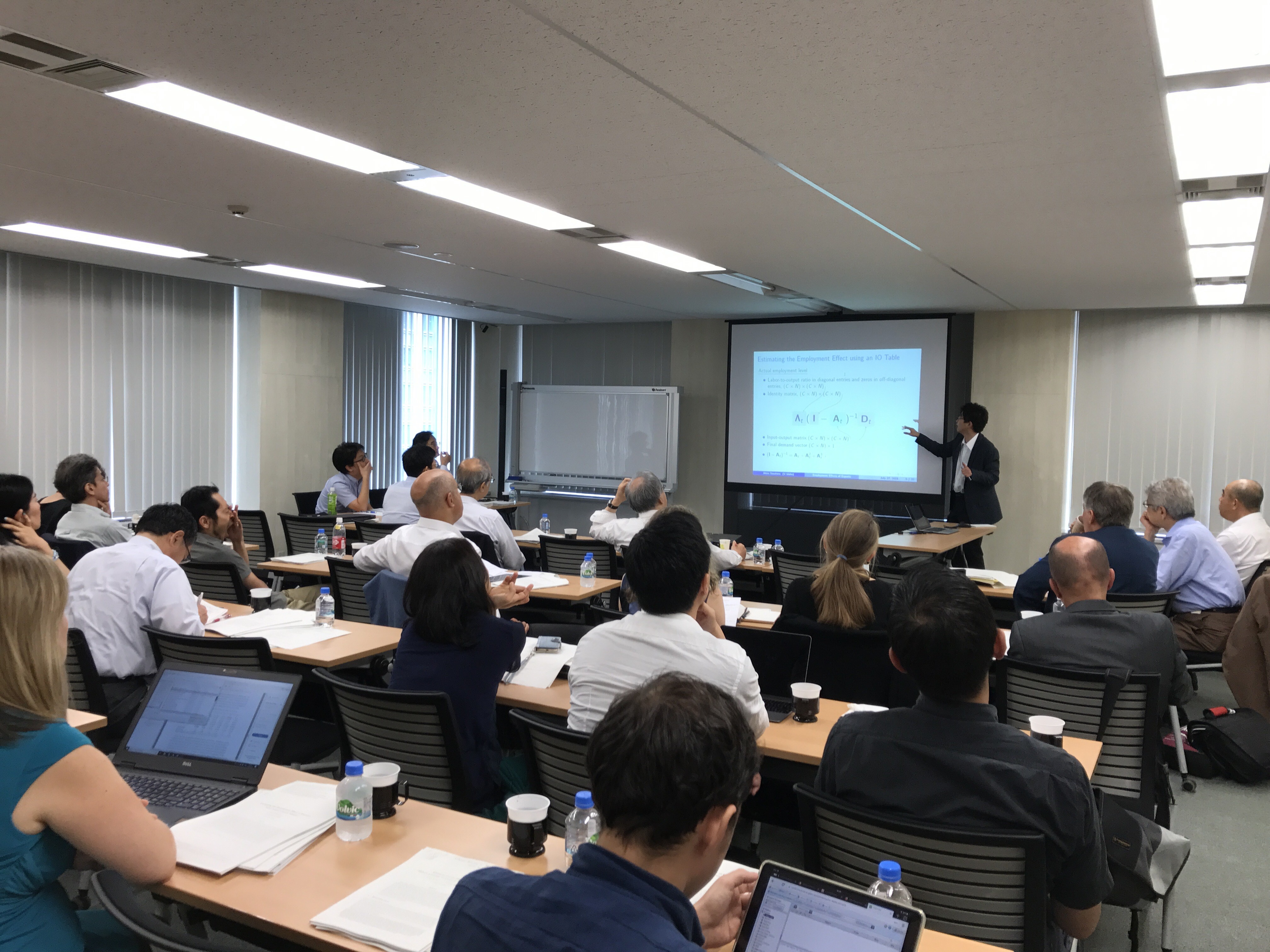
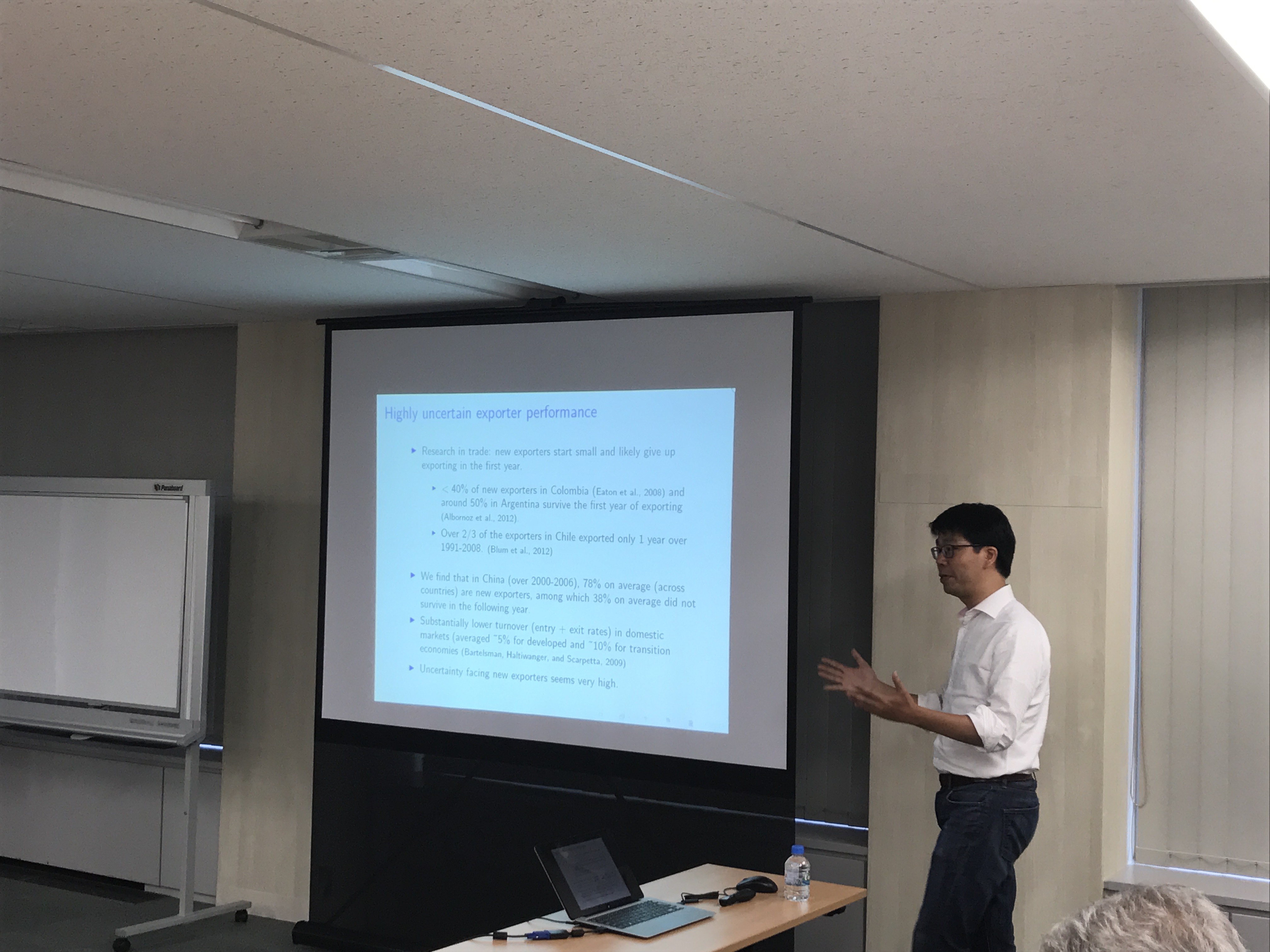
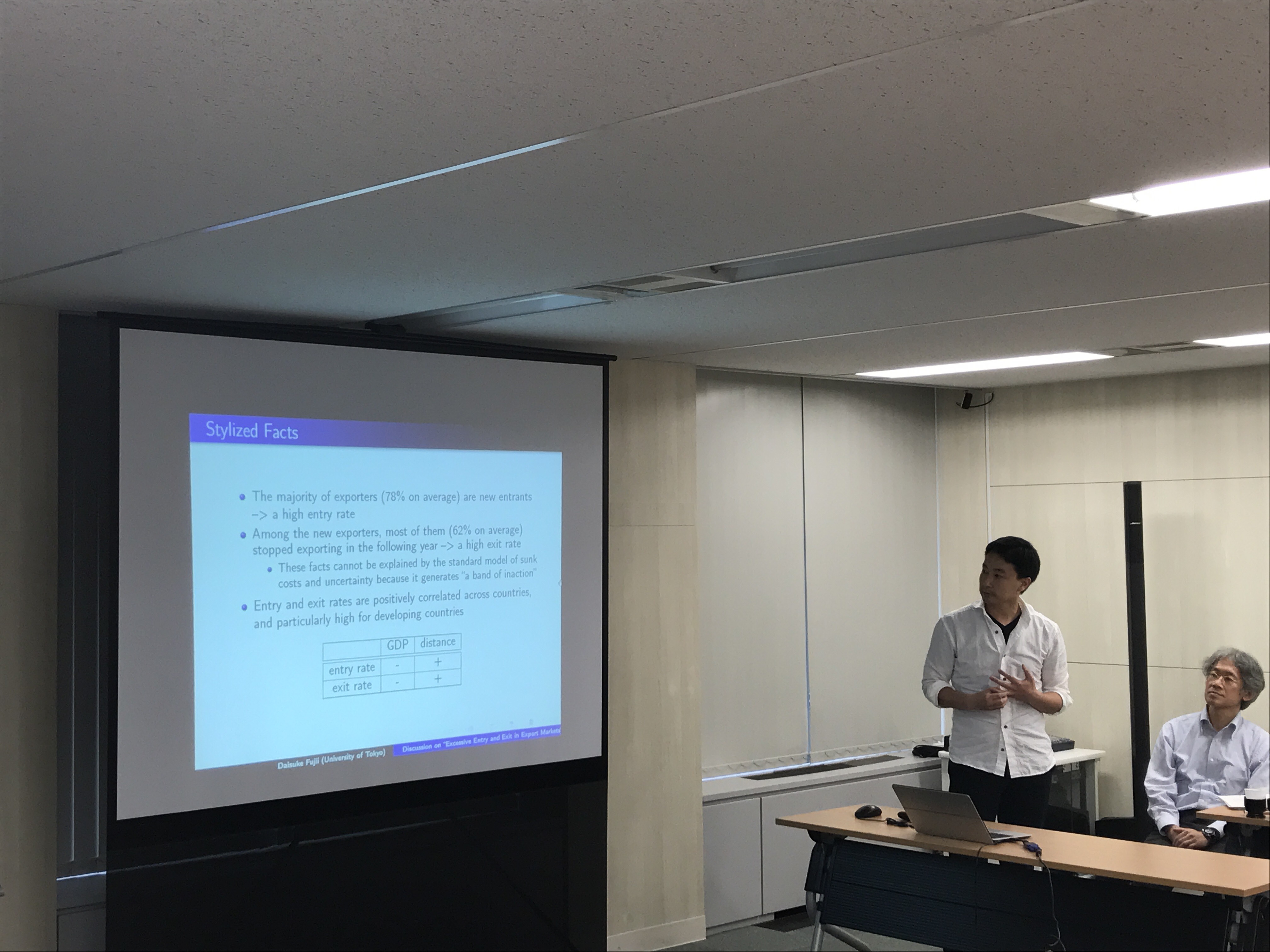
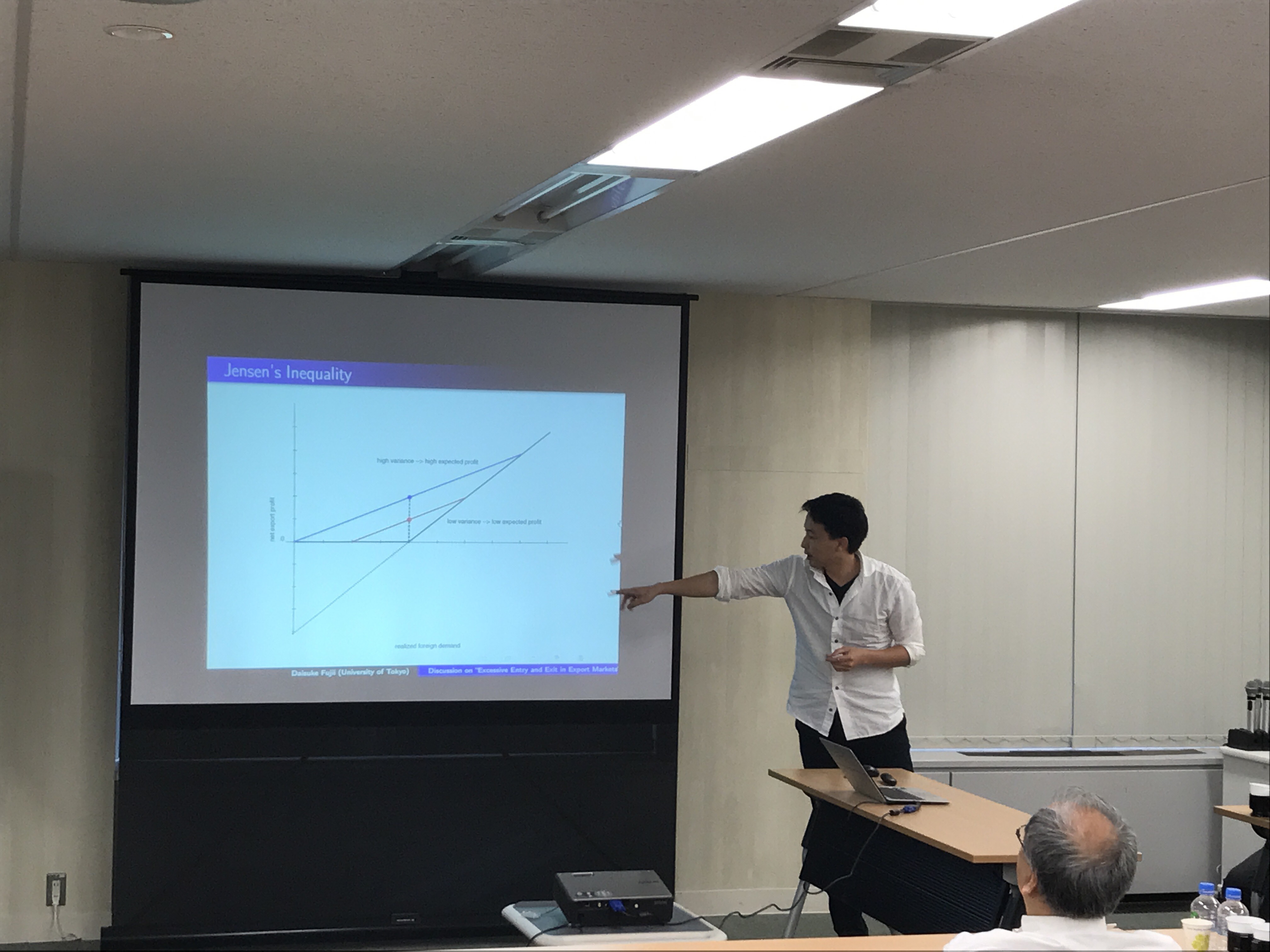
Most economists argued that the benefits from international trade far outweigh any feasible economic outcome that can be achieved through protectionism. Although there are pros and cons to both, there is no denying that globalization has had enormous influence on global technological innovation, and without free trade, we would fail to make the necessary advancements needed to achieve sustained economic growth. Tariffs may protect enfant industry’s companies from foreign competitors and give them time to develop their own competitive advantages. Protectionism may also temporarily create jobs for domestic workers. However, in the long term, free trade may strengthen industry’s competitiveness and contribute to global growth. Global and regional arrangements may also be useful to enhance welfare impacts of international trade.
The papers at the TRIO conference 2018, sponsored jointly by the National Bureau of Economic Research (NBER), the Tokyo Center for Economic Research (TCER), and the Centre for Economic Policy Research (CEPR), addressed some of these questions and provided the most recent answers. We invited ten papers to the Conference, which was held at Fukuracia Tokyo Station on July 27, 2018. A special issue of the Journal of the Japanese and International Economies (JJIE) on the conference theme will be published under the Guest Editorship. Authors whose papers are presented at the conference are supposed to submit their papers to the JJIE special issue. Papers submitted for this special issue will undergo the normal journal reviewing process.
Special TWID on Evidence-based Policy Making
- Organizers:
Yasuyuki Sawada (Graduate School of Economics)
Aya Suzuki (Department of International Studies, Graduate School of Frontier Sciences)
Yoshito Takasaki (Graduate School of Economics and Graduate School of Public Policy)
Taiji Furusawa (Graduate School of Economics)
Kenichi Ueda (Graduate School of Economics and Graduate School of Public Policy) - June 21, 2018
- Venue: Kojima Conference Room, the Economics Research Annex (Kojima Hall), The University of Tokyo
- Program
-
Tokyo Workshop on International and Development Economics (TWID), in collaboration with the Japan International Cooperation Agency (JICA) and the Policy Alternative Research Institute (PARI), the University of Tokyo, held a workshop entitled “the Special TWID on Evidence-based Policy Making” on empirical analyses on education and health issues in developing countries, inviting Professor Pascaline Dupas of the Stanford University.
We first had three presentations from Japanese researchers. The first talk was on the impacts of establishment of health-related centers on the behavior of pregnant mothers using the panel data of Uganda, while the second one was on analyzing the causal relation between the psychic cost of receiving vaccinations and the actual take-ups using a randomized controlled trial (RCT) in Nigeria, and the third one was on estimating the impact of self-learning method of KUMON on school children in Bangladesh, also relying on a RCT.
Lastly, we had a keynote lecture by Professor Dupas on the impact of free secondary school education on children using a RCT. They have periodically followed their sample students since 2008 and estimated the returns to education at the labor market. Their study was a great example in which the research contributed in the process of formalizing the free secondary school education in Ghana by providing rigorous academic evidence.
Workshop on Advances in Econometrics 2018
- Organizer:
Katsumi Shimotsu (The University of Tokyo)
Hidehiko Ichimura (The University of Tokyo) - June 17-18, 2018
- Venue: KKR Dogo Yuzuki
- Program
-
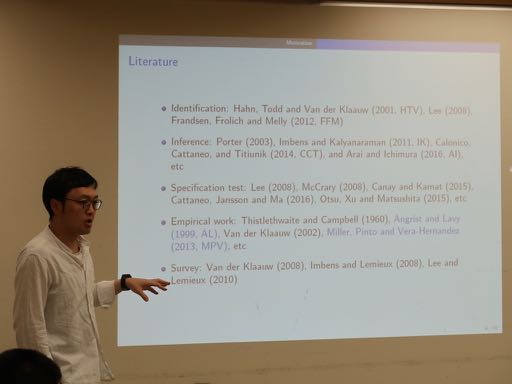

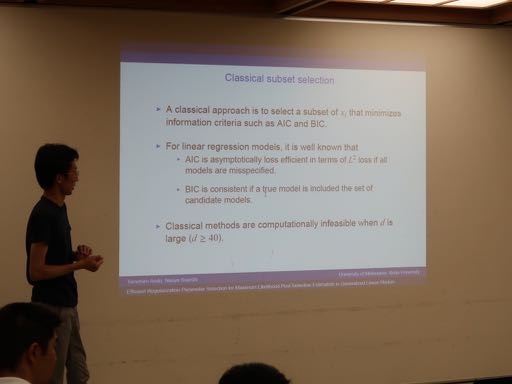
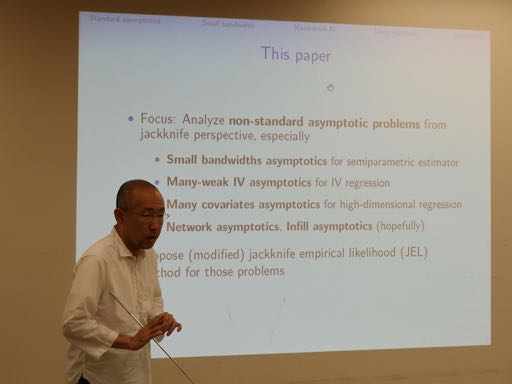
In this conference, eleven econometricians who are affiliated with universities in and outside Japan presented their recent research results.
Many Japanese econometricians conduct research actively at universities outside Japan, but there are few opportunities for them to meet each other and discuss each other’s research, and even fewer opportunities for them to meet econometricians in Japan and discuss their research.
This conference served as a focal point for Japanese econometricians who reside outside Japan and econometricians at Japanese universities, and a lively discussion and exchanges of information are conducted. Presentations were given on a wide range of topics including partial identification, asymptotic theory, jackknife method, treatment effect, regression discontinuity design, and model selection. The participants' affiliation includes the following universities: London School of Economics, University of Aarhus, University College of London, Monash University, Massachusetts Institute of Technology, University of British Columbia, Waseda University, Kobe University, Tsukuba University, and University of Tokyo.
Global History and Hybrid Political Economy in Early Modern Eurasia, c.1550-1850
- Organizer: Koji Yamamoto (The University of Tokyo)
- April 21-22, 2018
- Venue: Institute for Advanced Study on Asia
- Program
-
The Global History and Hybrid Political Economy in Early Modern Eurasia, c.1550-1850 was held on 21 and 22 April at the Institute for Advanced Study on Asia. Two groups based in University of Tokyo - PoETS (CIRJE) and the Global History Collaborative (GHC) - coordinated with Political Economies of International Commerce (PEIC) to hold this symposium. PEIC is the research institute of the University of Kent in UK, and for this symposium, seven scholars belonging to PEIC came to Japan. The website shows the programme. (https://docs.google.com/document/d/1Ty-6zvnZiqsyjSUlbL3Bbz7p9JRwRTYBIk6TTuFj2Y0/edit) On 21th April, after Dr. Koji Yamamoto explained the aim of this symposium, four researchers from Kent and three Japanese researchers presented their own research outcomes in three sessions. Their topics covered a broad range of the international commerce and global history, such as Japanese economic system in Tokugawa era, the activity and the effects of the cooperation in seventeenth century England, the commercial network of women in early modern Britain. On the second day, we held three sessions in which six scholars presented their interesting research outcomes. They discussed international trade commodities, such as cloth, sugar, tobacco and tea, European subordination to Indian state, and commercial networks in Southeast Asia actively. Attendants’ disciplines and interests were diverse, and we think this diversity greatly contributed to the success of the symposium. For example, the study of economic system in England was scrutinised by researchers from the standpoints of Asian history, and such comments gave rise to unexpected, but creative, discussion. Thus, these questions and replies represented the importance and interests in the global history both . As each session included the presentations from both researchers from Kent and Japanese researchers, discussion often focused on the broader perspectives covering the network in Eurasia. Finally, Dr. Koji Yamamoto, Prof. William Pettigrew, and Prof. Alessandro Stanziani concluded the symposium in a panel discussion. Pettigrew mentioned the future of global history and explained two important directions that may help make global history more fruitful. One is the potential of focusing on concrete actors like trading companies. The other is the importance of political economies. He argued that the study of political economy enables us to develop a balanced picture of global history, and that global perspectives can contribute to the study of political economies. Prof. Stanziani emphasised that historians need to go beyond eurocentrism for studying global history and distinguish between ideal models and practices in history. The model which historians utilised as the tool for analysing historical events is often based on European theory, which has the possibility of preventing them from studying history from global perspective. As for political economies, he argued that they are quite diverse, and diverse political economies have overlapped as global scale. Dr. Yamamoto suggested that using a wider variety of sources can contribute to reconstructing case studies more thoroughly, which can in turn lead to the creation of bigger, more balanced, pictures. In addition, he insisted on the importance of complementarity between scholars so that we can start breaking down national and linguistic barriers.


color.png)